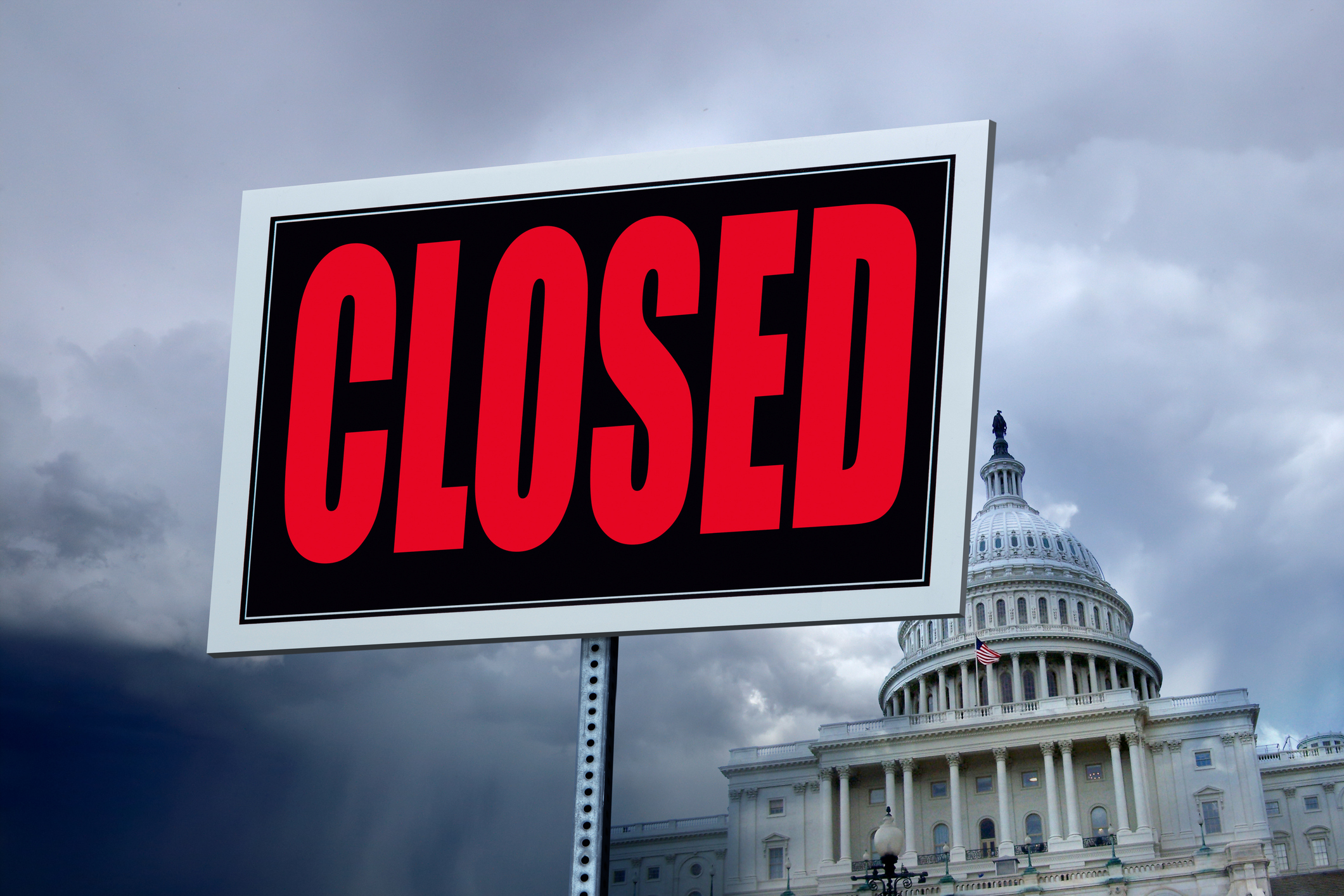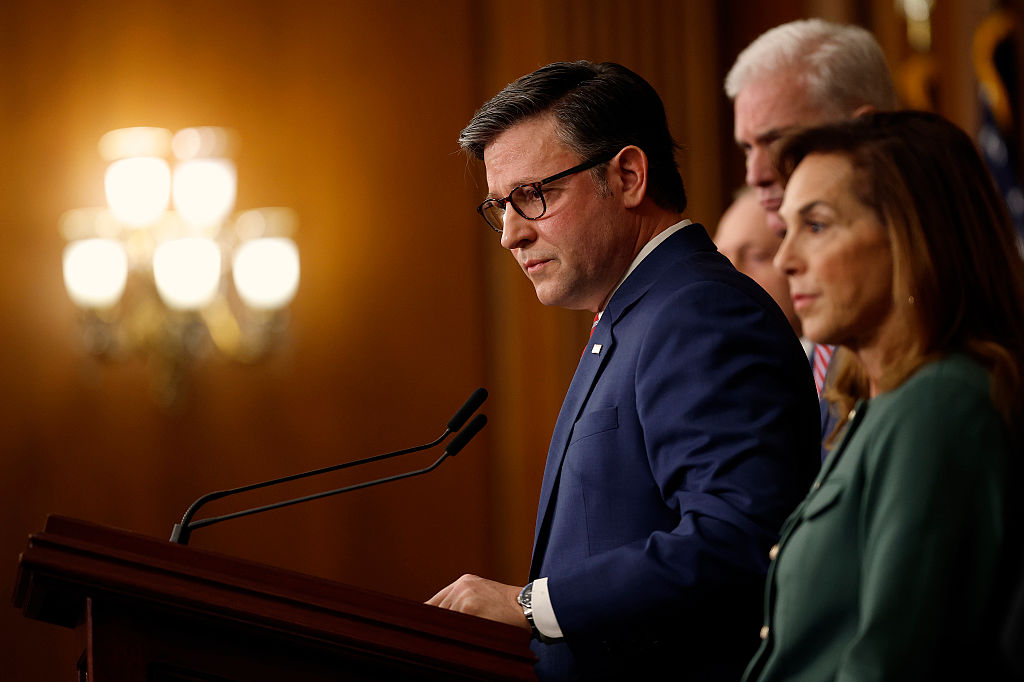The Shutdown Standoff Is Heading for Its Next Big Test
A key mid-October deadline could intensify the shutdown fight in Washington, and the fallout could soon hit workers and your wallet.


Profit and prosper with the best of Kiplinger's advice on investing, taxes, retirement, personal finance and much more. Delivered daily. Enter your email in the box and click Sign Me Up.
You are now subscribed
Your newsletter sign-up was successful
Want to add more newsletters?

Delivered daily
Kiplinger Today
Profit and prosper with the best of Kiplinger's advice on investing, taxes, retirement, personal finance and much more delivered daily. Smart money moves start here.

Sent five days a week
Kiplinger A Step Ahead
Get practical help to make better financial decisions in your everyday life, from spending to savings on top deals.

Delivered daily
Kiplinger Closing Bell
Get today's biggest financial and investing headlines delivered to your inbox every day the U.S. stock market is open.

Sent twice a week
Kiplinger Adviser Intel
Financial pros across the country share best practices and fresh tactics to preserve and grow your wealth.

Delivered weekly
Kiplinger Tax Tips
Trim your federal and state tax bills with practical tax-planning and tax-cutting strategies.

Sent twice a week
Kiplinger Retirement Tips
Your twice-a-week guide to planning and enjoying a financially secure and richly rewarding retirement

Sent bimonthly.
Kiplinger Adviser Angle
Insights for advisers, wealth managers and other financial professionals.

Sent twice a week
Kiplinger Investing Weekly
Your twice-a-week roundup of promising stocks, funds, companies and industries you should consider, ones you should avoid, and why.

Sent weekly for six weeks
Kiplinger Invest for Retirement
Your step-by-step six-part series on how to invest for retirement, from devising a successful strategy to exactly which investments to choose.
After Congress failed to pass a funding bill by October 1, the country entered a government shutdown. Lawmakers now face another critical deadline, but negotiations remain at a standstill.
While essential employees continue to work, their paychecks won’t be processed if Congress doesn’t pass a budget by October 13. The shutdown also threatens programs like WIC, which could run out of funds within two weeks, and SNAP, which may face similar challenges if the stalemate extends past October.
With no resolution in sight, the shutdown’s effects are starting to ripple through the economy. Delayed reports, including the latest jobs data, make it harder to gauge the full impact.
From just $107.88 $24.99 for Kiplinger Personal Finance
Become a smarter, better informed investor. Subscribe from just $107.88 $24.99, plus get up to 4 Special Issues

Sign up for Kiplinger’s Free Newsletters
Profit and prosper with the best of expert advice on investing, taxes, retirement, personal finance and more - straight to your e-mail.
Profit and prosper with the best of expert advice - straight to your e-mail.
Why October 15 matters
October 15 is an important deadline, in part because it’s the next scheduled pay date for active-duty military service members. Considered essential employees, active-duty military have continued working during the shutdown, but if Congress doesn’t pass a budget by October 13, the troops’ payroll won’t be processed on time.
Several key federal programs depend on a timely budget. The Special Supplemental Nutrition Program for Women, Infants, and Children (WIC), used by millions of families, is particularly vulnerable and could run out of funding.
Since this government shutdown takes place at the start of the federal fiscal year, WIC agencies don’t have money to issue to participants, and the program’s funding could run out in as little as two weeks.
The Supplemental Nutrition Assistance Program (SNAP) loads money onto participants’ cards at the beginning of the month, so participants already have their money for the month of October. But if the government shutdown isn’t resolved by the end of the month, SNAP could also face funding issues.
Economists are warning of increased economic risk if the government shutdown isn’t resolved. The monthly jobs report should have been released this past Friday, but its release has been postponed.
Without that data, it’s difficult to monitor the economic damage caused by the shutdown, creating a sense of uncertainty around the United States economy.
Where negotiations stand now

The current negotiations center around expiring health insurance subsidies. If those subsidies expire, middle-class Americans could see their health insurance premiums double or triple.
Democrats are demanding that Congress permanently extend the health insurance tax credits before the open enrollment period begins on November 1. Republicans refuse to commit to extending subsidies while negotiating a budget, stating that they will review the subsidies once the government shutdown ends.
As of Monday, the Senate voted on the funding bills needed to end the shutdown six times, failing to reach the 60 votes needed. The Senate is scheduled to reconvene on October 8 for another vote.
What happens if the deadline passes
If Congress fails to come to an agreement and reopen the government by October 13, there could be many consequences. Federal workers and contractors, including military members, will be forced to go without their next paycheck, which could be a major financial strain for individuals and families without substantial savings.
After the 2019 government shutdown, Trump signed a law guaranteeing back pay for federal employees once a shutdown ends. However, a draft White House memo released Tuesday indicates that workers on unpaid leave may not be guaranteed compensation this time.
When questioned about back pay, Trump responded, “I would say it depends on who we’re talking about.”
While programs like Social Security and Medicare will continue to issue payments, customer service and new application processing times will be slowed because of limited staff.
A prolonged government shutdown could significantly affect federally funded programs. WIC funding could run out in just two weeks, leaving financially vulnerable families with even less money for food. Should the shutdown last through the end of the month, SNAP recipients could find themselves in a similar position.
If SNAP and WIC funding runs out, food banks and food pantries are likely to see additional demand as program recipients need more help affording food heading into the holidays.
Who’s feeling the pressure?
Both Republicans and Democrats are feeling the pressure to reach an agreement. There’s already plenty of attention on the 2026 midterm elections, which could potentially change the majority in the House and Senate.
In a poll conducted by CBS news, 39% of respondents blame Trump and congressional Republicans for the shutdown, while 30% blame Democrats and 31% hold both parties responsible.
What it means for your money
It’s impossible to predict how long the government shutdown will last. If you rely on government pay, benefits or contracts, it’s important to be cautious with your money at this time. Avoid any unnecessary purchases and try to save as much money as possible.
There are several resources available for government employees affected by the shutdown. Government employees created a crowdsourced spreadsheet of shutdown assistance programs for employees.
Additionally, Maryland launched a Federal Shutdown Loan Program that provides support to Maryland residents who are essential federal employees not receiving pay.
Staying informed about the government shutdown can help you navigate the uncertainty. It can also help you learn about available resources and assistance. Even if you don’t rely on government pay, the shutdown has widespread effects on the economy, so it’s important to stay informed about the latest updates as Congress continues to work toward a resolution.
related content
Profit and prosper with the best of Kiplinger's advice on investing, taxes, retirement, personal finance and much more. Delivered daily. Enter your email in the box and click Sign Me Up.

Paige Cerulli is a freelance journalist and content writer with more than 15 years of experience. She specializes in personal finance, health, and commerce content. Paige majored in English and music performance at Westfield State University and has received numerous awards for her creative nonfiction. Her work has appeared in The U.S. News & World Report, USA Today, GOBankingRates, Top Ten Reviews, TIME Stamped Shopping and more. In her spare time, Paige enjoys horseback riding, photography and playing the flute. Connect with her on LinkedIn.
-
 Nasdaq Leads a Rocky Risk-On Rally: Stock Market Today
Nasdaq Leads a Rocky Risk-On Rally: Stock Market TodayAnother worrying bout of late-session weakness couldn't take down the main equity indexes on Wednesday.
-
 Quiz: Do You Know How to Avoid the "Medigap Trap?"
Quiz: Do You Know How to Avoid the "Medigap Trap?"Quiz Test your basic knowledge of the "Medigap Trap" in our quick quiz.
-
 5 Top Tax-Efficient Mutual Funds for Smarter Investing
5 Top Tax-Efficient Mutual Funds for Smarter InvestingMutual funds are many things, but "tax-friendly" usually isn't one of them. These are the exceptions.
-
 One of the Most Powerful Wealth-Building Moves a Woman Can Make: A Midcareer Pivot
One of the Most Powerful Wealth-Building Moves a Woman Can Make: A Midcareer PivotIf it feels like you can't sustain what you're doing for the next 20 years, it's time for an honest look at what's draining you and what energizes you.
-
 I'm a Wealth Adviser Obsessed With Mahjong: Here Are 8 Ways It Can Teach Us How to Manage Our Money
I'm a Wealth Adviser Obsessed With Mahjong: Here Are 8 Ways It Can Teach Us How to Manage Our MoneyThis increasingly popular Chinese game can teach us not only how to help manage our money but also how important it is to connect with other people.
-
 Looking for a Financial Book That Won't Put Your Young Adult to Sleep? This One Makes 'Cents'
Looking for a Financial Book That Won't Put Your Young Adult to Sleep? This One Makes 'Cents'"Wealth Your Way" by Cosmo DeStefano offers a highly accessible guide for young adults and their parents on building wealth through simple, consistent habits.
-
 My Spouse and I Are Saving Money for a Down Payment on a House. Which Savings Account is the Best Way to Reach Our Goal?
My Spouse and I Are Saving Money for a Down Payment on a House. Which Savings Account is the Best Way to Reach Our Goal?Learn how timing matters when it comes to choosing the right account.
-
 We're 78 and Want to Use Our 2026 RMD to Treat Our Kids and Grandkids to a Vacation. How Should We Approach This?
We're 78 and Want to Use Our 2026 RMD to Treat Our Kids and Grandkids to a Vacation. How Should We Approach This?An extended family vacation can be a fun and bonding experience if planned well. Here are tips from travel experts.
-
 Why Most Millionaires Don't Feel Wealthy — and What It Really Takes to Feel Financially Secure
Why Most Millionaires Don't Feel Wealthy — and What It Really Takes to Feel Financially SecureA growing share of Americans reach millionaire status yet still worry about money. Here's why wealth feels different today and how to build true financial confidence.
-
 You Could Be Overpaying for Internet. Here’s How to Choose the Right Type
You Could Be Overpaying for Internet. Here’s How to Choose the Right TypeFiber, cable, 5G wireless and satellite internet all offer different speeds, reliability and price points. Understanding the differences could help you lower your monthly bill or improve performance.
-
 My First $1 Million: Retired From Real Estate, 75, San Francisco
My First $1 Million: Retired From Real Estate, 75, San FranciscoEver wonder how someone who's made a million dollars or more did it? Kiplinger's My First $1 Million series uncovers the answers.